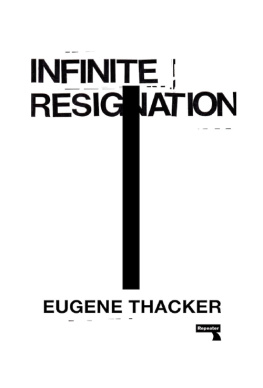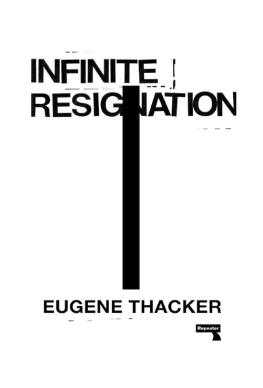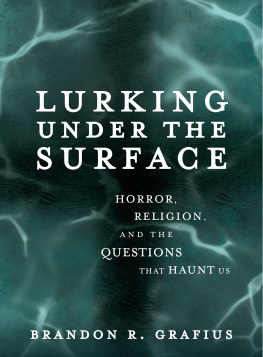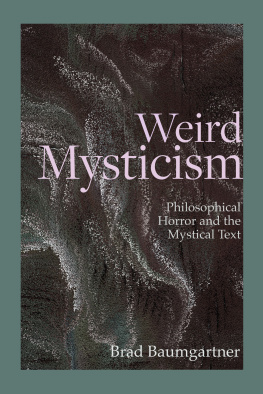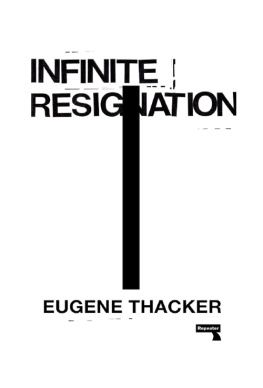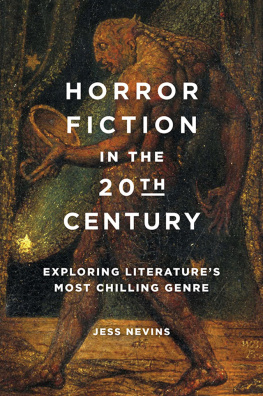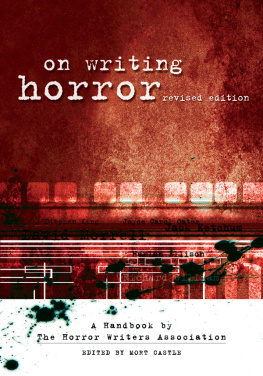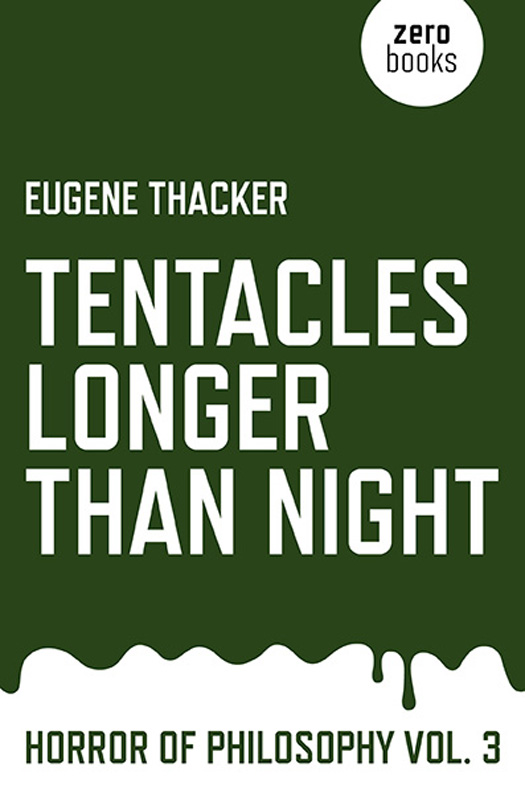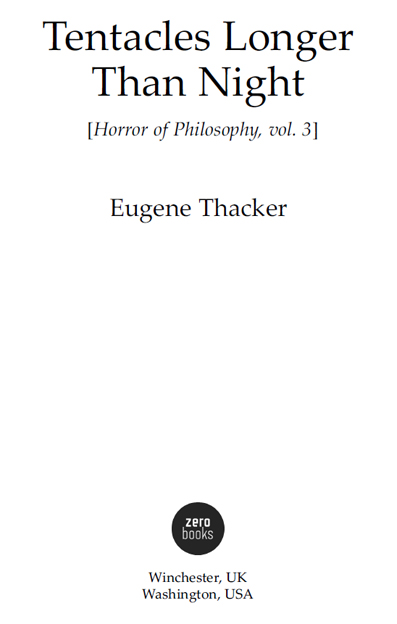First published by Zero Books, 2015
Zero Books is an imprint of John Hunt Publishing Ltd., Laurel House, Station Approach,
Alresford, Hants, SO24 9JH, UK
www.johnhuntpublishing.com
www.zero-books.net
For distributor details and how to order please visit the Ordering section on our website.
Text copyright: Eugene Thacker 2014
ISBN: 978 1 78279 889 7
All rights reserved. Except for brief quotations in critical articles or reviews, no part of this book may be reproduced in any manner without prior written permission from the publishers.
The rights of Eugene Thacker as author have been asserted in accordance with the Copyright, Designs and Patents Act 1988.
A CIP catalogue record for this book is available from the British Library.
Design: Stuart Davies
Printed and bound by CPI Group (UK) Ltd, Croydon, CR0 4YY
We operate a distinctive and ethical publishing philosophy in all areas of our business, from our global network of authors to production and worldwide distribution.
Also in the series:
In the Dust of This Planet (Horror of Philosophy, vol. 1)
Starry Speculative Corpse (Horror of Philosophy, vol. 2)
1. Tentacles Longer Than Night
The Vast and Seething Cosmos (Poe, Lovecraft). In 1843, Edgar Allan Poe published his short story The Black Cat. It opens with the following passage:
For the most wild, yet most homely narrative which I am about to pen, I neither expect nor solicit belief. Mad indeed would I be to expect it, in a case where my very senses reject their own evidence. Yet, mad am I not and very surely do I not dream. But to-morrow I die, and to-day I would unburthen my soul. My immediate purpose is to place before the world, plainly, succinctly, and without comment, a series of mere household events. In their consequences, these events have terrified have tortured have destroyed me. Yet I will not attempt to expound them. To me, they have presented little but Horror to many they will seem less terrible than baroques. Hereafter, perhaps, some intellect may be found which will reduce my phantasm to the common-place some intellect more calm, more logical, and far less excitable than my own, which will perceive, in the circumstances I detail with awe, nothing more than an ordinary succession of very natural causes and effects.
An opening that is, perhaps, unparalleled in horror literature. Poe prepares us to expect something incredible, but without giving us any particular clue as to what that will be. Regardless of what follows, we as readers are primed to experience something indefinite, something the narrator does not or cannot define in any concrete way. All that we know from this opening is that what the narrator has witnessed seems to defy all rational explanation. The narrator even questions himself was it a dream, a drunken hallucination, insanity itself? This self-interrogation (before the narrative has even begun) raises the stakes of the story. Whatever abstract horror has happened, it cannot be explained by the narrator. And yet, it must be explained, there must be an explanation. The narrator is so committed to this notion that he is willing to question his own sanity so that the Horror can be explained. And, the narrator continues, if I cant explain it then there must be someone else who can. In lieu of this, he can only hope that someone else (doubtless we, the dear readers) will come along and provide an explanation, some explanation, any explanation.
What cannot be accepted is that something happened for no reason. But this event is not just an everyday event. It has the character of being out-of-place, of not fitting into our everyday or even scientific modes of explaining the world. It threatens the order of things produced by we human beings, living human lives in a human world largely (we presume) of our own making. That something, that event, might threaten this order of things, and that it would happen for no reason this is, for the narrator of The Black Cat, the real horror. It is a thought that cannot be accepted, without either abandoning reason and descending into the abyss of madness or making the leap of faith into religion and mysticism. It is as if, before Poes story has even begun, the horror tale itself is in a state of crisis, the narrator nearly having a break-down before us, only able to communicate himself in vague terms and uncertain utterances.
The story does go on, however. And through the narrators point of view, we encounter a string of events that involves depression, alcoholism, a fire, a tavern, a noose, strange portents, the cellar of a house, murder, inhuman wailing, and two black cats, which may or may not be the same cat reincarnated. The Black Cat gives us a classic example of an unreliable narrator, who suggests strange events that may be supernatural, but which are, at the same time, undercut by the narrators mental instability. Was that shadowy burn-mark on the wall really an image of the deceased cat, or was our unreliable narrator just seeing things? Is the white patch on the black cats chest changing shape and forming the image of a gallows, or has the narrator had too much to drink? These and other conundrums produce the kind of suspenseful frisson for which Poe is well known. And the wavering of the story, between its all in his head and it really happened is also a hallmark not only of Poes work, but of the entire tradition of supernatural horror.
So much is this a cornerstone of supernatural horror that, almost a century later, H.P. Lovecraft could open his story The Shadow Out of Time with the following:
After twenty-two years of nightmare and terror, saved only by a desperate conviction of the mythical source of certain impressions, I am unwilling to vouch for the truth of that which I think I found in Western Australia on the night of July 17-18, 1935. There is reason to hope that my experience was wholly or partly a hallucination for which, indeed, abundant causes existed. And yet, its realism was so hideous that I sometimes find hope impossible. If the thing did happen, then man must be prepared to accept notions of the cosmos, and of his own place in the seething vortex of time, whose merest mention is paralysing. He must, too, be placed on guard against a specific lurking peril which, though it will never engulf the whole race, may impose monstrous and unguessable horrors upon certain venturesome members of it. It is for this latter reason that I urge, with all the force of my being, a final abandonment of all attempts at unearthing those fragments of unknown, primordial masonry which my expedition set out to investigate.
Lovecrafts narrator expresses much of the same disbelief and commitment to explanation that Poes narrator does. But Lovecraft does give us more details. The narrator of The Shadow Out of Time is one Nathaniel Wingate Peaslee, Professor of Political Economy at Miskatonic University and resident of Arkham, Massachusetts. We are also given concrete references to a date (July 17-18, 1935), a place (Western Australia), and, it seems, an object of the horror (unknown, primordial masonry). And yet we know nothing more than we did with The Black Cat. Peaslees narrative is just as confused, uncertain, and delirious as that of the narrator of The Black Cat. Like the latter, Peaslee also questions himself, more than willing to attribute what he witnessed to hallucination or even insanity.


